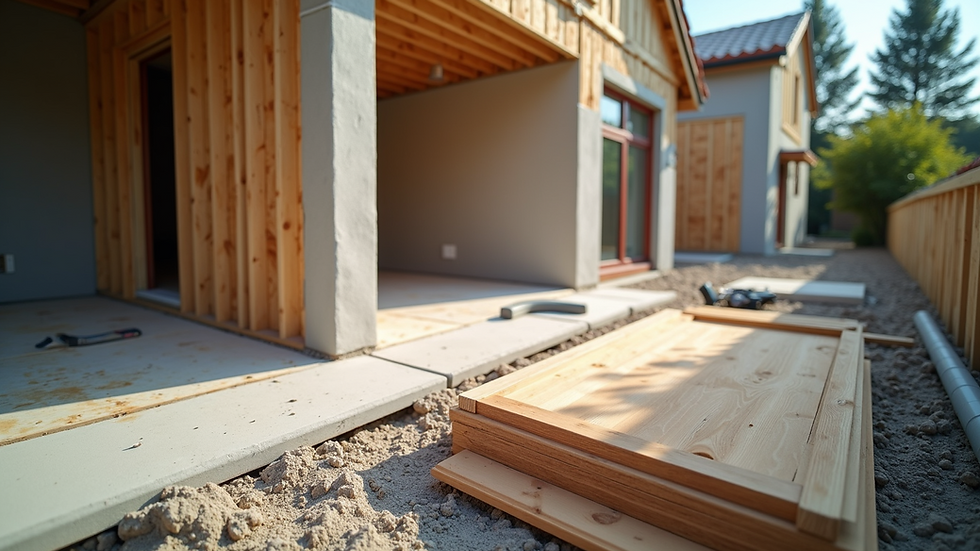Why Accurate Estimation is Key for Home Renovation Projects
- Yanne Spirovski
- May 12
- 4 min read
Home renovation projects can often feel overwhelming. With so many decisions to make and potential pitfalls to navigate, one of the most critical aspects that can make or break the success of a project is accurate estimation. In this blog post, we will discuss why accurate estimation is essential for home renovation projects and how it can lead to a smooth, successful endeavor.
Accurate Estimation: The Foundation of Success
Accurate estimation is the process of determining the costs, time, and resources needed for a home renovation project. It involves evaluating all aspects of the project, including materials, labor, permits, and unforeseen costs. The importance of precise estimates cannot be overstated.
For instance, if you plan to remodel your kitchen, knowing the exact costs of cabinets, countertops, and appliances is crucial. A common mistake homeowners make is underestimating these costs, leading to budget overruns and delays. According to a National Association of Home Builders survey, 30% of homeowners experience budget overruns due to inaccurate estimates.
Having accurate estimates helps homeowners allocate funds appropriately and minimizes the risk of unexpected surprises down the line.

Understanding the Costs Involved
When embarking on a home renovation, understanding the costs involved in the project is essential. Each component, from construction to finishes, has its price tag. Accurate estimation takes into account various factors that contribute to the total cost.
1. Materials
Materials often represent a significant portion of the renovation budget. Accurate quantity and price estimation for items like flooring, tiles, paint, and fixtures will prevent you from running out of materials or encountering price spikes. Be sure to get quotes from different suppliers to find the best prices.
2. Labor
Labor is another critical factor in the overall cost estimation. The complexity of the renovation often dictates the type and amount of skilled labor required. Homes requiring custom work will likely have higher labor costs than those with standard repairs. Ensure you get detailed quotes from contractors outlining what is included.
3. Permits and Fees
Many renovations require permits, especially if they involve structural changes. These fees can often be overlooked in the planning phase. Checking your local building codes and regulations will help you account for these costs from the beginning. According to HomeAdvisor, permits can account for up to 10% of a renovation budget.
Accurate estimation of these elements will help create a comprehensive budget, reducing the potential for financial strain during the project.

Are Free Estimates Really Free?
The phrase "free estimate" is often bandied about in the home renovation industry. However, what does it truly mean? While many contractors offer free estimates, it's essential to be aware that they may not provide the complete picture.
When a contractor offers a free estimate, it often covers only an initial assessment of the project and may not account for intricate details that can affect the final cost. Some contractors may also require you to commit to their services before finalizing the full estimate, which could lead to additional costs that weren't initially disclosed.
To ensure you are fully informed, ask for detailed breakdowns from your contractors. This will help ensure you are aware of all potential costs before making a decision.

The Benefit of a Buffer
Accurate estimation isn't just about being precise - it also involves anticipating potential challenges. A well-planned budget should include a buffer for unexpected expenses, typically around 10-20% of the total budget.
Home renovations can uncover hidden problems, such as outdated electrical wiring or plumbing issues. Having a financial buffer means you can address these issues without derailing your entire project. According to a report from the Remodeling Magazine, many renovations can reveal at least one surprise that requires added funds.
Including a buffer ensures that you won’t have to cut corners or compromise on quality due to unexpected costs.
Practical Steps to Achieve Accurate Estimations
Now that we've discussed the importance of accurate estimations and the potential pitfalls, it's crucial to outline practical steps to help achieve this goal.
Create a Detailed Plan: Write down everything you want to accomplish in your renovation. Make sure to detail every specific aspect, from large changes like room additions to smaller tasks like new paint colors.
Research: Investigate the costs of materials and labor in your area. Online resources, local suppliers, and home improvement stores can provide valuable pricing information. For convenience, consider downloading a free estimate worksheet to help you keep track.
Get Multiple Quotes: Reach out to several contractors for quotes. This will give you a broader perspective on pricing and help you identify any outliers.
Account for Hidden Costs: As mentioned earlier, set aside funds for hidden costs by adding a buffer to your budget.
Review and Revise: Estimation is an ongoing process. Revisit your estimates as the project progresses and adjust for any changes that arise.
By following these steps, you can significantly increase the accuracy of your project estimations, leading to a successfully completed renovation.

Final Thoughts on Accurate Estimation
Accurate estimation may seem like just a small part of the renovation process, but its impact is far-reaching. It lays a solid foundation for your project, guiding your decisions, budgets, and timelines. Every dollar accurately estimated can help keep your project on track and reduce stress.
Planning for your renovation shouldn’t be a headache. By understanding the costs involved, ensuring clarity with contractors, incorporating buffers, and adhering to practical steps, you can navigate renovation projects with confidence. Invest time in your estimations and reap the rewards of a successful and satisfying remodeling experience.


Comments